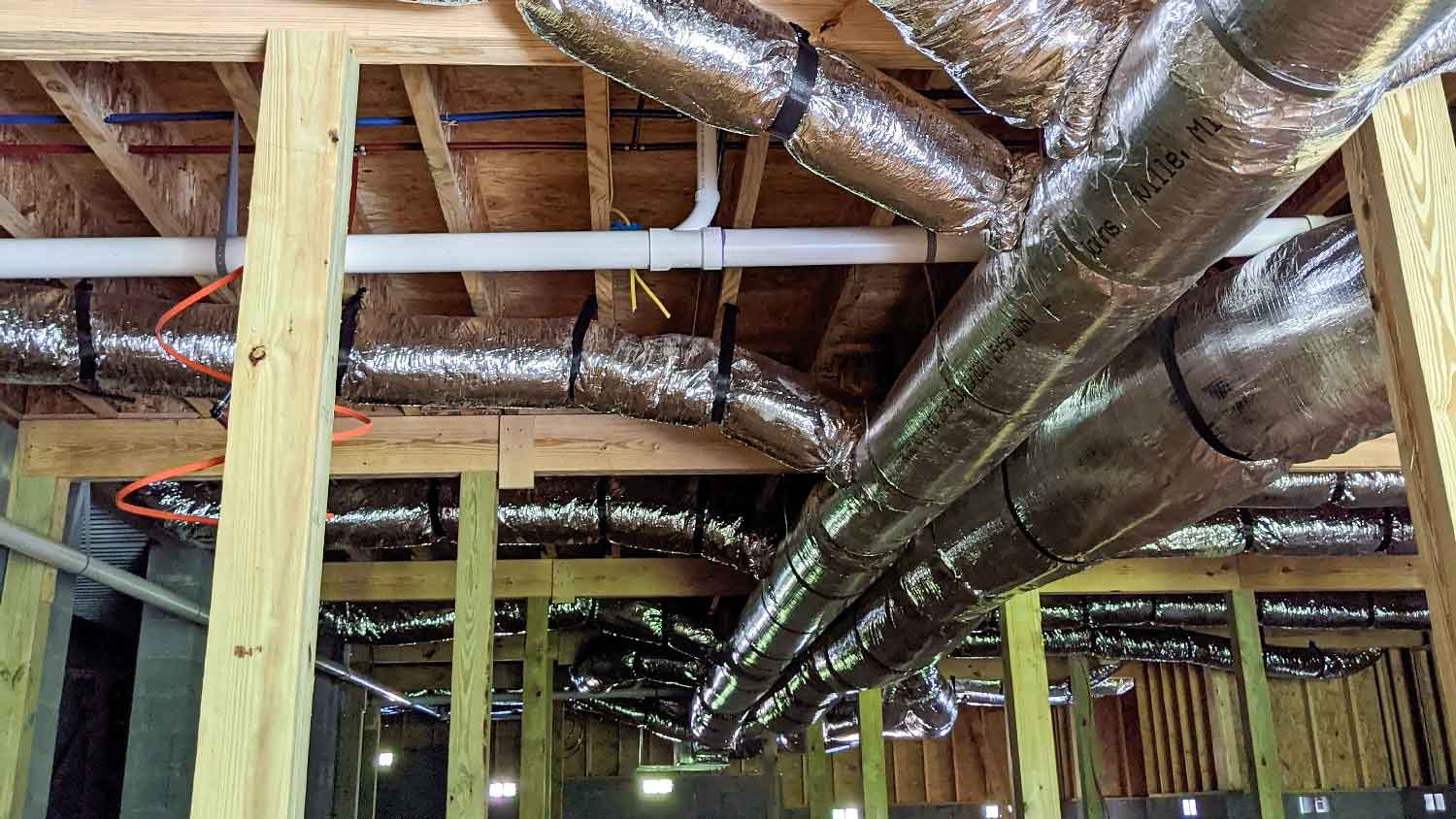
Moving a furnace a few feet is not a huge matter. However, moving a furnace to another room or different part of the house will probably cost a few thousand dollars. It's a major job involving numerous different professionals.
Reduce dust, allergens, and mold in your home


Installing a dehumidifier is a DIY-friendly task for most homeowners.
Pay attention to the size and temperature of your basement when choosing a humidifier.
Checking the overall humidity levels of your entire home can help you make a game plan.
Looking to take advantage of some extra square footage in your home? A basement can be a valuable addition to your home, but it can also be a pretty damp area. Having a solid basement dehumidifier system in place can help you turn your scary basement into an enjoyable place to spend time or a safe place to store belongings. Keep reading to learn how to choose a dehumidifier.
Understanding the size of your basement is the first step in selecting an appropriate dehumidifier. Basements come in various sizes and the capacity of a dehumidifier is directly related to the square footage it can effectively cover. Measure the length and width of your basement to calculate the square footage accurately. Larger basements require dehumidifiers with higher capacities, usually measured in pints of moisture removed per day. A unit with inadequate capacity might not effectively reduce the humidity, while an overly powerful unit might lead to excessive drying. Finding the right balance ensures optimal moisture control without unnecessary energy consumption.
Basements are notorious for being cooler than the rest of the house, especially in the winter months. This natural chill can create an environment even more prone to excess moisture, leading to issues like mold growth and musty odors. One crucial factor to consider when selecting a dehumidifier for your basement is its ability to operate efficiently at low temperatures. Traditional dehumidifiers may struggle in colder environments, hindering their effectiveness. However, specialized units equipped with a low-temperature operation feature have been engineered to excel in these conditions.
The low-temperature operation feature is a game-changer for basement dehumidifiers. It allows these devices to function optimally even in chilly settings, ensuring they continue to extract moisture effectively. What sets these units apart is their ability to prevent frost buildup on the coils. Frost formation on the coils can interrupt the dehumidification process, leading to inefficient operation. Dehumidifiers with this feature are designed to defrost automatically, ensuring seamless functionality regardless of the temperature fluctuations in your basement.
These specialized dehumidifiers often come with energy-efficient technologies, allowing you to save on electricity costs while keeping your basement dry and comfortable. When shopping for a basement dehumidifier, keep an eye out for units explicitly labeled as suitable for low-temperature operation.
If you live in a humid area, it may surprise you to learn that some people actually work to achieve a higher level of humidity in the home. We have a feeling if you’re reading this article, you want to get rid of some humidity. Don’t just focus on your basement, give your whole home a review.
Assessing the overall humidity levels in different parts of your home provides valuable insights into your moisture control needs. High levels of humidity throughout a home can lead to various problems, including mold growth (you really want to prioritize getting rid of any black mold), warped wood, and deteriorating indoor air quality. If you notice humidity issues in multiple areas, consider investing in a whole-house dehumidification system. This integrated solution ensures consistent humidity control throughout your home, promoting a healthier environment for you and your family. It can be a good idea to check air quality levels if your home has humidity issues—ask around for a few quotes to get a better idea of indoor air quality testing costs in your area.
Before installing a dehumidifier, if you have a lot of humidity in your home, it’s a good idea to hire a mold inspector near you to confirm if you have any mold growth. That way, you can get a clear picture of what you need to do regarding mold remediation, and you can better decide how much effort you need to put into removing humidity from your home in the future.

Before you set out to buy a dehumidifier, nail down what your goals are, so you can find the exact right system for your needs. Are you primarily concerned about preventing mold growth, protecting valuable items, or improving the overall indoor air quality? Each objective might require a slightly different approach. For mold prevention, focus on a dehumidifier with excellent moisture removal capabilities. To protect valuables, consider a unit with a built-in hygrometer and adjustable humidity settings. If enhancing indoor air quality is your primary concern, opt for a dehumidifier equipped with air filtration features to capture allergens and pollutants, ensuring cleaner and fresher air in your living space.
Your hardworking dehumidifier will start to collect a lot of water, but it can only collect so much, so you need to have a plan for collecting and removing that water. Dehumidifiers typically come with either built-in reservoirs or continuous drainage options. If you choose a unit with a reservoir, you'll need to empty it regularly to prevent overflow. Continuous drainage, on the other hand, allows the dehumidifier to expel water automatically through a hose, ensuring hassle-free operation. Consider the proximity of the nearest drainage outlet and your willingness to perform regular maintenance tasks when deciding between these options.
It’s so easy to forget about taking care of our basements—out of sight out of mind—but a little TLC can go a long way. Proper weatherproofing is vital for maintaining a dry and comfortable basement environment. Inspect your basement for any signs of water leaks, cracks, or inadequate insulation. Seal any visible cracks and gaps in the walls, floors, and foundation to prevent water infiltration. Additionally, ensure your basement is adequately insulated to regulate temperature and minimize condensation. Weatherproofing measures not only enhance the efficiency of your dehumidifier but also contribute to energy savings by creating a well-sealed and insulated space.
If you are really worried about having a moist basement and want a little extra peace of mind, you can always hire a professional to assist you with this project. The decision to install and maintain the dehumidifier yourself, or to hire a professional, depends on your expertise and comfort level with DIY tasks. Installing a standalone dehumidifier is generally straightforward and comes with user-friendly instructions. However, if you are unsure about the installation process or have a whole-house dehumidification system that requires professional expertise, it's advisable to hire a licensed HVAC technician. Professionals can ensure proper installation, optimal placement, and seamless integration with your existing HVAC system, maximizing the dehumidifier's efficiency and longevity.
From average costs to expert advice, get all the answers you need to get your job done.

Moving a furnace a few feet is not a huge matter. However, moving a furnace to another room or different part of the house will probably cost a few thousand dollars. It's a major job involving numerous different professionals.

Whole-house humidifier costs vary based on the type and size of the unit, along with other factors. The price might be worth it for people living in dry regions.

Discover the cost to install ductwork. Learn about average prices, cost factors, and tips to save money on your ductwork installation project.

Tackling unwanted odors from indoor plants can be tricky. Learn how to use a carbon filter in your duct fan to improve air quality.

Even when you're sweating up a storm on a hot day, your AC should keep its cool. Here's what to do when condensation on your AC signals larger problems.

Do you have a clogged AC drain line? We dig into the reasons behind those pesky blockages and how to clear them for optimal AC performance.